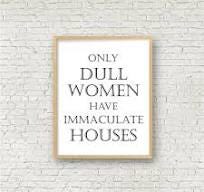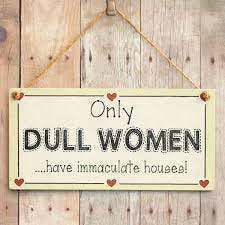I feel a peculiar shame when people come round and tell me my house is clean.
“isn’t it immaculate”
“sorry, I just get really stressed if it’s messy”
“I wish could be organised”
“I wish I could leave the house without having to tidy everything up first but there we go”
Behold, yet another way to pit people against each other over things that don’t matter. I’m kind of irked that I’m writing about it if I’m honest. Whereas women of my nan’s generation and (crucially) class would whisper about those with less than immaculate houses, there’s been a shift to proclaim that those who choose to be neat are somehow failing – they are dull. Why is so much store placed on housework? Why do I feel I need to apologise for doing something that makes my life simpler and my mind more calm?
Why are we even having this conversation?



I mean it’s just a bit of fun, no one actually thinks that a clean house means a person is dull, do they? Or do people really feel so threatened by the fact that they don’t choose to keep their house in the state that the TV ads demand they choose to dress up their preferred way of living as somehow superior and more interesting? It’s an irrelevant contest and it’s as tiresome as the infernal competitions around stomach flatness, nose shape and bum curve. Yet it exists.
Spring cleaning used to be THE clean. People were so busy doing other things like sowing, harvesting, preserving, making clothes, making stories and making fires that the shine on a tap (should they have one) wasn’t of prime importance. Spring cleaning was simply logical - warmer weather meant doors were flung open, floors were swept, fireplaces and stoves were cleared of debris. As time gathered pace and understanding of germs and their impact on health grew stronger, then cleaning became part of the ongoing fight against contagious disease.
This all seems fairly innocuous so far. Cleaning seems to be a simple, practical task that makes where we live nicer and possibly prevents disease.
What happened?
For women of my mum’s background, keeping the family clean and fed was the only thing that meant you weren’t on your uppers, the only way to feel good about yourself. When you’ve got next to nothing you tend to look after it and keeping a clean house was a way of showing good character as well as simple housekeeping skills. This idea of cleanliness, godliness, and women being somehow linked has its roots in the eighteenth century, the industrial revolution and that oh so prickly concept of moral purity.
“Women were thought to be the key to a better, more moral life…they had to be protected from the polluting influences of the real world.”
(Holdsworth, 1988)
In Victorian times women were “angels of the house” whose existence was only defined in relation to their men. This notion has been recycled throughout the twentieth century, with the creation “traditional” fifties housewife, and the disquieting emergence of the trad wife movement. This is the subject of an essay yet to be written. Let’s focus on the subject in hand.
By the middle of the twentieth century, the Victorian ideal was almost usurped, women were working outside the home, technology meant that perhaps housework could be disposed of, and women could be freed to enjoy their brains, skills and interests. What happened? How did women go from being tied to the home to working outside the home then continuing to work once they stepped over the threshold?
As with so many aspects of modern life the root is the never ending need to make us buy. If women found other interests, then who would buy the home décor, the new cleaning products, the concept that the home is somehow an extension of themselves? This is what Angela Holdsworth has to say:
“Instead, the advertisers gave her a new image; The Balanced Homemaker. This paragon took pride in all the housework herself in the modern way, using the latest equipment, polishes and cleaning agents.”
And so, a new market was born. Just as the beauty industry is built around creating dissatisfaction and self-loathing before proffering solutions, at a price, so the homemaker concept does the same. All the market needs to keep the tills ringing (or indeed fingers clicking) is the creation of non-existent competition.
So what’s the problem with the signs?
While “dull women have immaculate houses” sounds kind of liberating, it merely strengthens the idea that carrying out household tasks somehow correlates with our own worth. Sneering about a person being “immaculate” is the same as sneering about a person for being grubby. Both acts perpetuate the myth that we are somehow defined by the state of the kitchen floor or our whether we have shiny bath taps.
Shiny bath taps may not bring me the same joy as a writing a poem or seeing new shoots emerge from carefully tended soil, but for others they might. Some days, shining the taps may be the only thing a person can do– and on that day, that bit of reflected light brings joy. For some people, keeping a clean home may be the only control they have in a chaotic life. For some people having a clean home makes them happy. Careless statements about dullness take away this joy. What makes one source of happiness more valid than another?
Change is needed. Running a house needs to be recognised as valuable and to handsomely remunerated, to be brought into the professional sphere so that people who wish to do other things be liberated. The skills involved in organising the clothing, feeding, hygiene and comfort of yourself and other humans is no mean feat and deserves to be respected. Change will not be brought about by collusion in the created competition, by either going down the trad wife route or being oh so modern and calling other people dull, all being it in a cheeky, self-deprecating manner.
It’s time to stop sniping at those who find joy in things that leave us cold. However it’s dressed, this kind of statement is no more than a lazy effort to create a sense of superiority. What makes a person happy is entirely up to them whether that’s writing a wonderful poem, painting, sewing, cooking great food, or keeping a house beautifully clean. So long as long as that person is fulfilled and whole that is all matters. People who feel fulfilled, without feeling the need to apologise for what brings that fulfilment are better placed to join the fight for the change that is so sorely needed.
Until next time
If you've enjoyed reading This Wild Feeling send me some love! Click the hearts, leave a comment, restack, with a note if you're feeling fancy, or share on your favourite social media ❤️
To read more of my poetry follow this link







My mother used to say, ‘if you haven’t written your name in the dust at least twice and had it covered up with more dust it’s not time to dust yet.’ But I’m sure these kinds of signs are an attempt to squash feminism. Your proper type where you can do what you want, where if cleaning floats your boats we get to do it without recriminations of any kind from ANYONE. For all society knows those ‘dull women’ might have an immense craft stash behind cupboard doors (🙋🏼♀️ guilty), be a sexual siren in bed (ah, the temptation to write guilty here too 😜), need order to think clearly whilst writing the next amazing poem/novel/phd paper, pay some else to do it, actually enjoy clutter, or just not give a flying f*ck - who knows and who should really care? These signs assign blame and guilt, are divisive, encouraging us to turn against and judge each other when we should be holding each other up. Patriarchy, misogyny, and capitalism working together to keep us down.
A fab piece of writing.